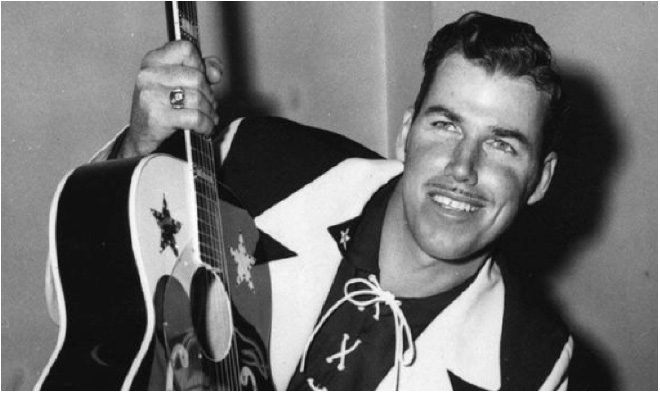SLIM & CHET
The longer we live, the longer our past, the shorter our future, the fewer our friends and heroes.
Wednesday was particularly bad.
I always enjoy grossing people out by relating how, some 30-plus years ago, I gave up backstage passes to Springsteen in Madison, Wisconsin, to drive to Milwaukee to see Slim Whitman. I’d say it’s the smartest thing I ever did, but in all fairness, I can’t remember if it was Slim or Mickey Gilley—which might not have been the smartest thing.
Whitman, though, was heaven—the voice that lends meaning to the word “ethereal.” Breathtaking. When he sang “Una Paloma Blanca”—the centerpiece of his phenomenally successful and pioneering direct-marketing TV campaign behind the album compilation All My Best—the packed concert hall crowd leapt to their feet cheering after he effortlessly, operatically swooped up an octave at the end of the first chorus.
Swear to God, the friend I was with had actually seen The Beatles, and said the Slim show was better.
But there was a bigger Beatles connection: George Harrison once said that Slim was the first person he’d ever seen playing a guitar, while Paul McCartney said that a poster of Slim, who played guitar left-handed due to losing most of his second finger on his left hand in an accident, gave him the idea of playing left-handed, too. And as that old TV commercial said, Slim “was number one in England longer than Elvis and The Beatles.”
Years later I met Harold Bradley, Owen’s brother, said to be the most recorded guitarist ever. I saw him play behind Whitman with the greatest instrumental sensitivity, as required by a voice that could soar high as “a bird in the sky,” to quote from “Una Paloma Blanca.”
Slim’s death brought me back in touch with him.
“I’ve lost a wonderful friend, and the world lost a wonderful talent,” he told me.
Harold lamented the fact that Slim had long lost his profile in Nashville, and rightly railed against the Country Music Hall of Fame for not having inducted him. And as effective as they were in selling millions of albums, those TV commercials also made Slim an easy target of late-night comedians, not to mention Mars Attacks!, which famously used his recording of “Indian Love Call” to kill off the space invaders.
But two of the coolest people ever, Bill Tush and Andy Kaufman, were totally hip to Slim. Tush, who became cable TV’s first star at Ted Turner’s Superstation WTBS in Atlanta, where he anchored the off-the-wall late-night news program before hosting the one hour skit-comedy show Tush, enlisted Slim as Tush’s first guest star. And Kaufmann was clearly awestruck when he introduced Slim to a Midnight Special audience in 1981, though he, too, had goofed on him in the past.
Within an hour of talking with Harold, I too lost a wonderful friend and the world lost a wonderful talent.
Chet Flippo was my music journalism hero back in Madison. I’d just begun writing for a throwaway music paper that was stacked on cigarette machines in the bars and clubs, and I’d done a piece on Dolly Parton. But I was also a big Rolling Stones fan, and Chet was the only writer I knew who was likewise a fan of both.
I sent Chet a note a few weeks before I took a trip to NYC, to see if I could meet with him. Of course I hoped he might let me write for him, but I was nowhere in the same country as he was talent-wise. Still, he wrote back, and sure enough, let me come by the Rolling Stone office, where he worked at the time. I still can’t believe that we became friends when I made the move to New York a few years later, and after he moved to Nashville and became Billboard’s bureau chief there, I actually did get to work for him.
Chet was as decent, honest, and committed a journalist as ever there was. Both he and Slim always remained true to themselves, and their audiences.
Some heroes, at least, live on.
Jim Bessman




comment closed